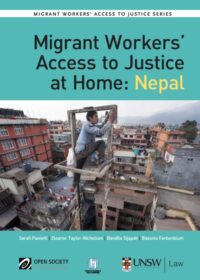Publications
Migrant Workers’ Access to Justice at Home: Nepal
Much attention has been directed to the exploitation of low-wage migrant workers in the Middle East, where harms are commonplace and severe, and access to justice is limited. But the story of labor migration begins and ends at home. The vulnerability of Nepali migrant workers to exploitation abroad is heightened by routine misconduct committed in Nepal during the pre-departure phase by individual agents, recruitment agencies, and other private actors. Migrant Workers’ Access to Justice at Home: Nepal is the first comprehensive analysis of the Nepali mechanisms through which migrant workers may seek remedies for harms suffered during recruitment or while working in the Middle East. The study finds that despite Nepal’s efforts to protect migrant workers, it is generally failing to hold private recruitment companies and individual agents accountable, and the vast majority of workers remain unable to access compensation or other forms of justice in Nepal or abroad. The study reveals that the laws that govern recruitment and placement of Nepali migrant workers are relatively robust, but their implementation and enforcement are weak. Migrant Workers’ Access to Justice at Home: Nepal aims to improve this situation by identifying clear pathways to improving the governance, operation, access and effectiveness of each of Nepal’s redress mechanisms, and to more effective regulation of migrant worker recruitment. The report presents detailed and empirically based recommendations for government and other stakeholders that can be implemented in the short- and medium-term, emphasizing the need for a rights-based approach that treats workers as holders of defined, enforceable rights. Migrant Workers’ Access to Justice at Home: Nepal will be relevant for other countries of origin in Asia and globally who have much to learn from each other’s efforts to address these common challenges. It also provides much-needed guidance for Nepali civil society to better understand, use, and test migrant worker justice mechanisms at home.

